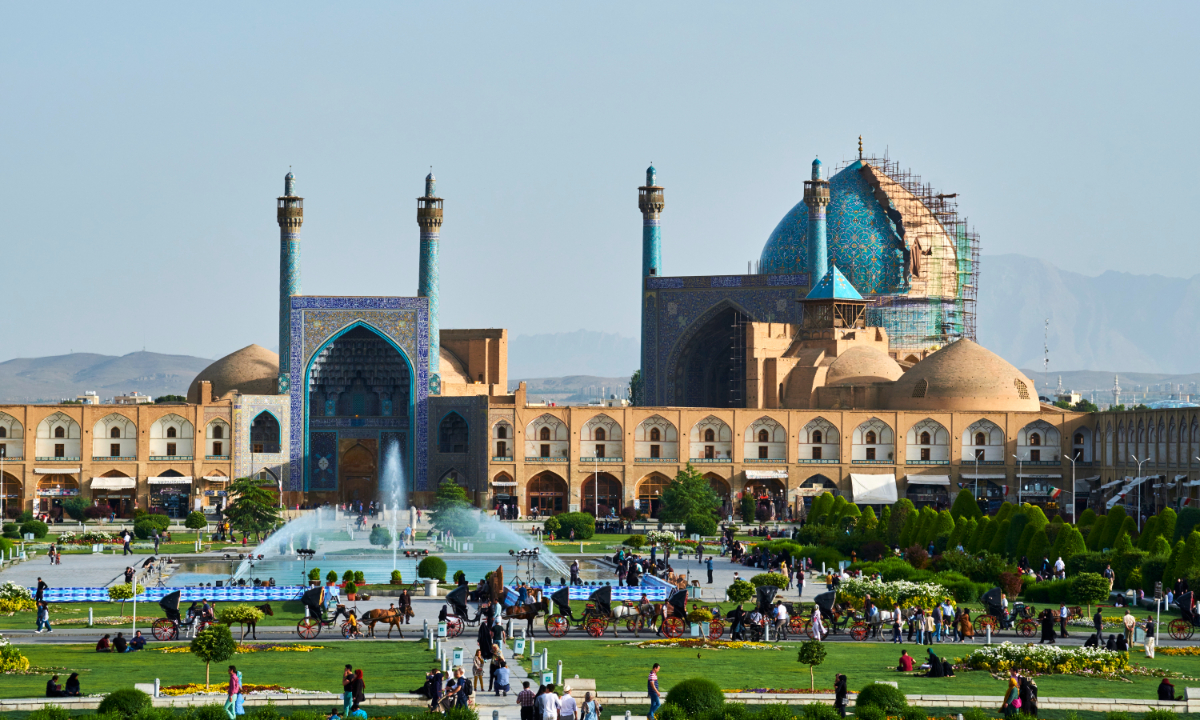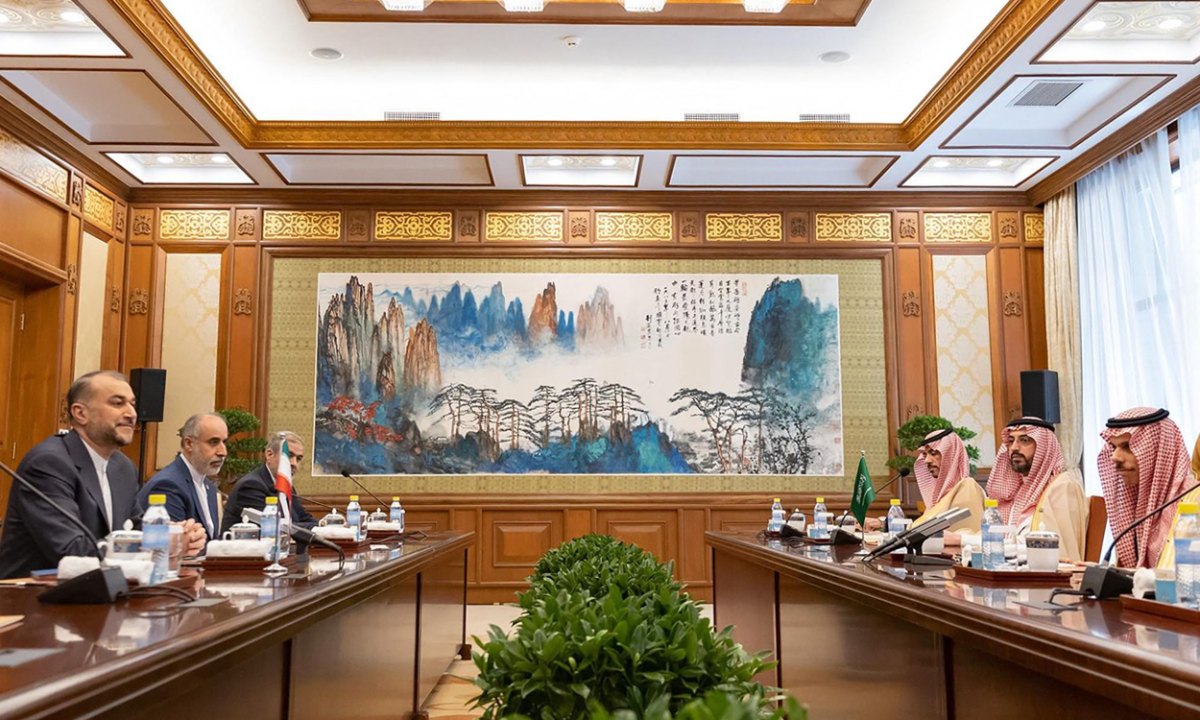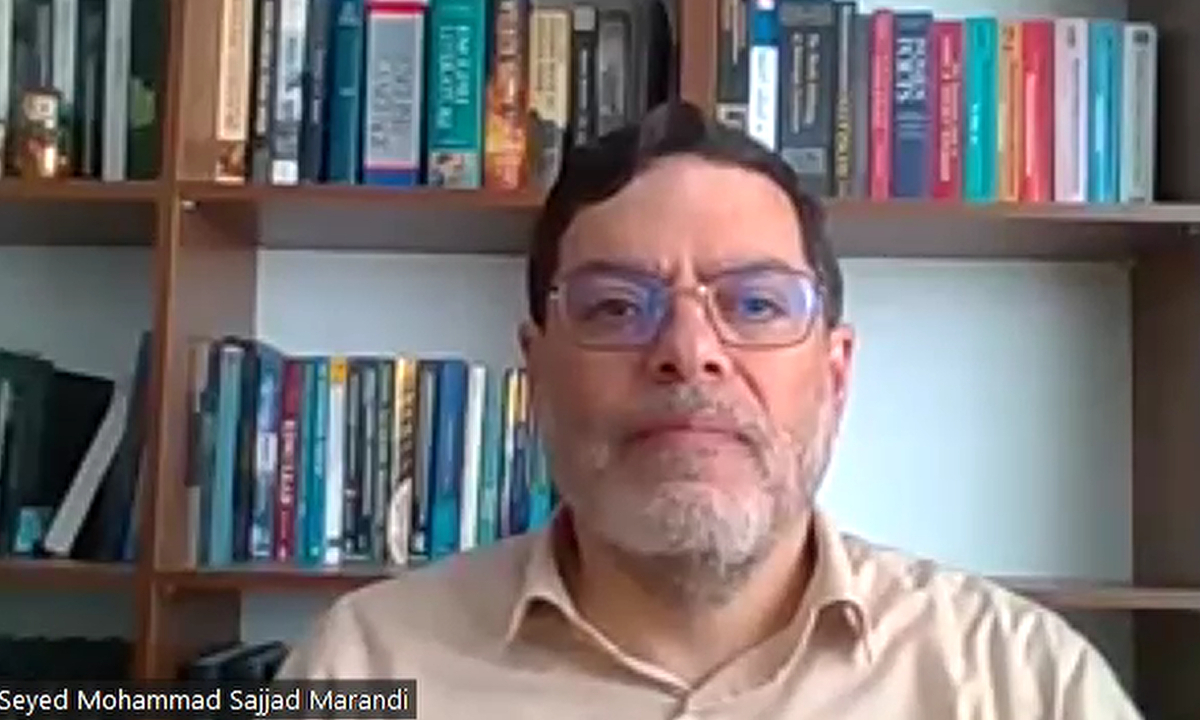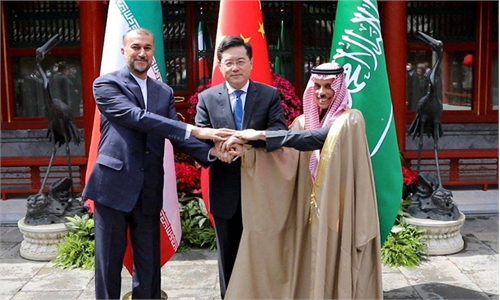IN-DEPTH / DIPLOMATIC CHANNEL
The rapprochement momentum in the Middle East will help decrease US’ destructive role in the region: vice president of Tehran University
Editor's Note:
The Iranian Foreign Ministry spokesperson Nasser Kanaani said on April 17 that Iran and Saudi Arabia will exchange mutual visits, including high-level ones, as part of the two countries' efforts to fully restore bilateral ties, in line with agreements to expand cooperation. Since the Saudi-Iran deal brokered by China on March 10, the two countries have headed steadily toward the restoration of bilateral ties, which is widely hailed in the international community for bringing peace to the long period of turbulence in the Middle East. Since the historic deal was inked, the region has witnessed a growing trend of countries' rapprochement and cooperation. Why did Iran and Saudi Arabia trust China in playing a mediating role? What is the influence of the rapprochement trend on the region and the world order? The Global Times reporters Xie Wenting and Bai Yunyi (GT) talked to the Vice President of the University of Tehran and Member of Iran's Presidential Delegation to China, Professor Mohammad Marandi (Marandi) on these topics and more.

GT: From your point of view, what are the reasons behind Iran and Saudi Arabia's trust in China's role as a peace mediator?
Marandi: There are a host of reasons at play. First, China, unlike the US, does not involve itself in the internal affairs of other countries. The US, whenever it wants to play the role of an honest broker, it, in reality, simply manipulates the situation. It manipulates [parties] for its own gains and benefits. China, under this and other circumstances, has shown itself to be very careful not to interfere in the internal affairs of other countries. And that's what made it a much more suitable host. This helped to bring about an environment for the resolution of problems.
In addition to that, I think it's the sheer weakness of the US that allowed this agreement to be reached. The US betrays and turns against its own friends. Therefore, many countries across the globe know that simply being a friend of the US or even being an ally of the US does not mean that they will be protected.
GT: How do you evaluate the recent progress in the Saudi-Iran rapprochement? How do you evaluate the role that China has played in this historic deal to promote peace between the two countries?
Marandi: I think that the role that the Chinese government has played is a constructive and substantial one. The Iraqi government also played a role before the Chinese government got involved and some progress was made at the negotiating table between Iran and Saudi Arabia.
Fortunately, in Beijing, the two sides were able to reach an agreement. I think it will hopefully be the beginning of a much better situation in West Asia, especially in the Gulf region. This is something that the US does not want to see. The US wants to keep West Asia divided. They want to keep Iran and Saudi Arabia, among other countries, separated from one another, and to keep the Saudi government dependent on the US.

GT: How would you summarize the regional political transformation after this historical deal was made? In your opinion, what are the more long-term geopolitical influences on the region and even on the global order to follow?
Marandi: It's still quite early to say. There are still many issues across the region. The US continues to support apartheid in Palestine. The US still has influence in many countries across the region and Western powers have dominated much of this region for hundreds of years.
However, since the US is on the decline, and momentum has been created by this rapprochement between Saudi Arabia and Iran which is significant, the hope is that the two countries can have an improved relationship. This momentum itself will help decrease the destructive role of the US in this region, so that people can live a better life.
For the last few decades, the West has destroyed much of our region. Hopefully, with the decline of Western power and the convergence of countries across the region, we will have a better future for our children, our grandchildren, and for generations to come.

GT: How will the recent development between Saudi Arabia and Iran, and the recent regional political transformation affect China and its role in the Middle East as well as on the global stage?
Marandi: China will benefit from it. China is a country that has significant interests in West Asia. The rise of Asia means that West Asia, East Asia, and the rest of Asia have to integrate and it's important for Asia and Eurasia to integrate. The Gulf region is the center of energy exports and a key part of the world as well. Therefore, we need a better political, socialand economic environment.
The improved relationship among countries in the Gulf region and the decreased role of the US in the West Asia is good for the region as well as for countries like China.
The US thrives on division and it needs division in order to maintain its dominance and hegemony. It also does this in the South China Sea. Therefore, it is highly important to prevent the US from playing on divisions, whether it's in East Asia or West Asia.
GT: What implications will the restoration of diplomatic relations between Saudi Arabia and Iran have on the Shanghai Cooperation Organisation (SCO)?
Marandi: Just as the improved relationship has a positive influence across the West Asian region, it definitely has a positive impact on other parts of Asia as well. So the members of the SCO will benefit from this improved relationship, because it will not only help improve the economic situation, but will also contribute to the improvement of the security situation.
We have to remember that the US has been using countries in the region to promote extremists and extremist groups, which have been a problem for the last few decades. So the less influence the US has on the region, the better countries can deal with extremist groups.
GT: How do you view the prospect of Iran and Saudi Arabia joining the BRICS?
Marandi: I think it is possible that both Iran and Saudi Arabia will join the BRICS. Western countries and the G7 hope to dominate the global economy and the decision-making process as they have done over past decades. While the Global South, the vast majority of the international community, believes that they must have an equal say, if not a greater say, because of their sheer numbers in how the global economy is managed. Therefore, it is important for the BRICS to have new members from the Global South that are powerful and influential.
GT: The de-dollarization process is ongoing in several parts of the world, especially in the petroleum industry. What's your take on it?
Marandi: De-dollarization is very important for the international community, because the dollar has been used as a weapon by the US against different countries. It is unreliable and it is dangerous.
Therefore, countries like China, Iran, and Russia among many others, need to move away from the dollar so that the US cannot use it as a weapon against them, whether it's because of politics or because of trade and business, and high tech industry advances. The US should not be allowed to use the dollar to put pressure on other countries.
Iran already sells a substantial amount of petroleum using currencies other than the US dollar.
I think for Saudi Arabia, ultimately it will be in its best interests to move away from the dollar as well in order to make sure that it is not vulnerable or less vulnerable to the US.
If the rapprochement continues, then I think the chances for Saudi Arabia to join the camp of de-dollarization increases substantially.
Since China is a major energy importer from the Gulf region, it would be ideal for China to be able to use China's yuan to import energy from the region.
The Iranian Foreign Ministry spokesperson Nasser Kanaani said on April 17 that Iran and Saudi Arabia will exchange mutual visits, including high-level ones, as part of the two countries' efforts to fully restore bilateral ties, in line with agreements to expand cooperation. Since the Saudi-Iran deal brokered by China on March 10, the two countries have headed steadily toward the restoration of bilateral ties, which is widely hailed in the international community for bringing peace to the long period of turbulence in the Middle East. Since the historic deal was inked, the region has witnessed a growing trend of countries' rapprochement and cooperation. Why did Iran and Saudi Arabia trust China in playing a mediating role? What is the influence of the rapprochement trend on the region and the world order? The Global Times reporters Xie Wenting and Bai Yunyi (GT) talked to the Vice President of the University of Tehran and Member of Iran's Presidential Delegation to China, Professor Mohammad Marandi (Marandi) on these topics and more.

Photo: VCG
GT: From your point of view, what are the reasons behind Iran and Saudi Arabia's trust in China's role as a peace mediator?
Marandi: There are a host of reasons at play. First, China, unlike the US, does not involve itself in the internal affairs of other countries. The US, whenever it wants to play the role of an honest broker, it, in reality, simply manipulates the situation. It manipulates [parties] for its own gains and benefits. China, under this and other circumstances, has shown itself to be very careful not to interfere in the internal affairs of other countries. And that's what made it a much more suitable host. This helped to bring about an environment for the resolution of problems.
In addition to that, I think it's the sheer weakness of the US that allowed this agreement to be reached. The US betrays and turns against its own friends. Therefore, many countries across the globe know that simply being a friend of the US or even being an ally of the US does not mean that they will be protected.
GT: How do you evaluate the recent progress in the Saudi-Iran rapprochement? How do you evaluate the role that China has played in this historic deal to promote peace between the two countries?
Marandi: I think that the role that the Chinese government has played is a constructive and substantial one. The Iraqi government also played a role before the Chinese government got involved and some progress was made at the negotiating table between Iran and Saudi Arabia.
Fortunately, in Beijing, the two sides were able to reach an agreement. I think it will hopefully be the beginning of a much better situation in West Asia, especially in the Gulf region. This is something that the US does not want to see. The US wants to keep West Asia divided. They want to keep Iran and Saudi Arabia, among other countries, separated from one another, and to keep the Saudi government dependent on the US.

Iran’s Foreign Minister Hossein Amir-Abdollahian (left) and Saudi Foreign Affairs Minister Prince Faisal bin Farhan (right) attend a meeting with members of their delegations, in Beijing on April 6, 2023, paving the way for normalized ties under a China-brokered deal. Photo: VCG
GT: How would you summarize the regional political transformation after this historical deal was made? In your opinion, what are the more long-term geopolitical influences on the region and even on the global order to follow?
Marandi: It's still quite early to say. There are still many issues across the region. The US continues to support apartheid in Palestine. The US still has influence in many countries across the region and Western powers have dominated much of this region for hundreds of years.
However, since the US is on the decline, and momentum has been created by this rapprochement between Saudi Arabia and Iran which is significant, the hope is that the two countries can have an improved relationship. This momentum itself will help decrease the destructive role of the US in this region, so that people can live a better life.
For the last few decades, the West has destroyed much of our region. Hopefully, with the decline of Western power and the convergence of countries across the region, we will have a better future for our children, our grandchildren, and for generations to come.

Professor Mohammad Marandi, vice president of the University of Tehran and member of Iran’s presidential delegation to China Photo: screenshot of GT’s video interview with Marandi
GT: How will the recent development between Saudi Arabia and Iran, and the recent regional political transformation affect China and its role in the Middle East as well as on the global stage?
Marandi: China will benefit from it. China is a country that has significant interests in West Asia. The rise of Asia means that West Asia, East Asia, and the rest of Asia have to integrate and it's important for Asia and Eurasia to integrate. The Gulf region is the center of energy exports and a key part of the world as well. Therefore, we need a better political, socialand economic environment.
The improved relationship among countries in the Gulf region and the decreased role of the US in the West Asia is good for the region as well as for countries like China.
The US thrives on division and it needs division in order to maintain its dominance and hegemony. It also does this in the South China Sea. Therefore, it is highly important to prevent the US from playing on divisions, whether it's in East Asia or West Asia.
GT: What implications will the restoration of diplomatic relations between Saudi Arabia and Iran have on the Shanghai Cooperation Organisation (SCO)?
Marandi: Just as the improved relationship has a positive influence across the West Asian region, it definitely has a positive impact on other parts of Asia as well. So the members of the SCO will benefit from this improved relationship, because it will not only help improve the economic situation, but will also contribute to the improvement of the security situation.
We have to remember that the US has been using countries in the region to promote extremists and extremist groups, which have been a problem for the last few decades. So the less influence the US has on the region, the better countries can deal with extremist groups.
GT: How do you view the prospect of Iran and Saudi Arabia joining the BRICS?
Marandi: I think it is possible that both Iran and Saudi Arabia will join the BRICS. Western countries and the G7 hope to dominate the global economy and the decision-making process as they have done over past decades. While the Global South, the vast majority of the international community, believes that they must have an equal say, if not a greater say, because of their sheer numbers in how the global economy is managed. Therefore, it is important for the BRICS to have new members from the Global South that are powerful and influential.
GT: The de-dollarization process is ongoing in several parts of the world, especially in the petroleum industry. What's your take on it?
Marandi: De-dollarization is very important for the international community, because the dollar has been used as a weapon by the US against different countries. It is unreliable and it is dangerous.
Therefore, countries like China, Iran, and Russia among many others, need to move away from the dollar so that the US cannot use it as a weapon against them, whether it's because of politics or because of trade and business, and high tech industry advances. The US should not be allowed to use the dollar to put pressure on other countries.
Iran already sells a substantial amount of petroleum using currencies other than the US dollar.
I think for Saudi Arabia, ultimately it will be in its best interests to move away from the dollar as well in order to make sure that it is not vulnerable or less vulnerable to the US.
If the rapprochement continues, then I think the chances for Saudi Arabia to join the camp of de-dollarization increases substantially.
Since China is a major energy importer from the Gulf region, it would be ideal for China to be able to use China's yuan to import energy from the region.


